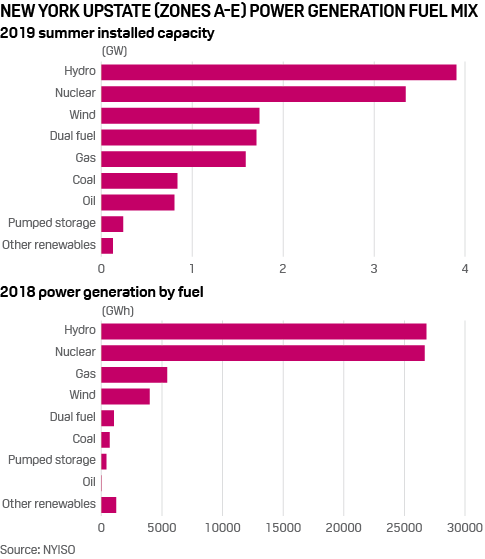Analysis: New York Coal Phase-Out Expected to Have Limited Power Market Impact

May 13, 2019 - The largest power market impact of stricter coal plant rules in New York state would likely be during winter peak hours, but with less than 1 GW of coal capacity remaining only a small portion of total generation would be affected, an analyst said Friday.
New York's retiring its coal fleet "is largely in line with our expectations, but with roughly 1 GW of coal capacity remaining that ran at a cumulative 8% capacity factor in 2018 it shouldn't be too impactful on the state's power markets," Kieran Kemmerer, power market analyst with S&P Global Platts Analytics, said in an email.
New York Governor Andrew Cuomo said Thursday that the New York State Department of Environmental Conservation has adopted final regulations, known as Part 251, to require all power plants in the state to meet carbon dioxide emissions limits. The rules "will ensure the state's remaining coal-fired power plants transition to cleaner, alternative sources of energy or shut down by 2020," according to a statement from the New York State Energy Research and Development Authority.
New York has two coal-fired power plants with a total installed 2019 summer capacity of 837 MW located in the northern, or upstate, region, according to the New York Independent System Operator. Coal accounts for 6% of upstate summer installed capacity.

The 322-MW Cayuga plant in Lansing and the 655-MW Somerset plant in the Town of Somerset produced 7% of upstate New York's power in 2018. Cayuga Unit 2 submitted a generator deactivation notice with NYISO in 2018 and the grid operator determined the unit can retire without impacting reliability.
The Somerset plant has higher winter production capability than in summer, 692.5 MW versus 685.9 MW, according to NYSIO data.
No significant regional market impacts are expected as a result of the plants shutting down, with Dan Dolan, president of trade group New England Power Generators Association, saying in an email that he does not see any real spillover into New England at this point.
Transition Plan
Plans are underway to redevelop the coal plant sites according to the plants' owner and state officials.
"We have presented a transition plan to the state that would retire the coal plants in advance of the timeline set forth in the Part 251 regulations while creating a viable new business and jobs in their place, using renewable energy," Michael Enright, an executive with Beowulf Energy, manager of the two plants, said in an email Friday.
Noting the plan has been well received by all major stakeholders, Enright said, "right now, we are focusing our efforts on what happens to these sites after coal -- and how they can and should be part of New York's Green New Deal," referring to the governor's extensive decarbonization plans.
Negotiations with various state agencies and other parties are underway and details remain limited, but Somerset's Town Supervisor Daniel Engert said in a phone call that a 70-MW solar facility along with a data center powered by hydropower from the Niagara Falls system are part of the plan.
The town pushed back against a large wind farm that had been proposed in favor of the current transition plan, Engert said.
But he expressed dismay at the lack of communication from state utility regulators and the governor's office. "I'm frustrated with the state because no resources have been devoted to informing the town about the impact on local jobs and plans for moving forward," he said.
"The plant owners have presented their transition plan to the governor's staff and the [Public Utilities Commission] PSC and so far I've heard crickets. Writing regulations is the easy part, but now comes the heavy lifting which is about how to move forward so I hope they get their act together," Engert said.
With the regulations finalized, public outreach and other components of the transition plan can now advance, a spokesman for the governor's office, Jordan Levine, said in an email.
"The State stands ready to help workers and communities transition to a clean energy future through the Governor's Clean Climate Careers initiative created to address the needs of the local communities affected by any closures, as well as a host of clean energy programs to support transitioning these plants away from coal and its negative impacts on public health," Levine said.
"To that end, we look forward to working with Supervisor Engert and the Town of Somerset now that these regulations have been adopted," he added.

